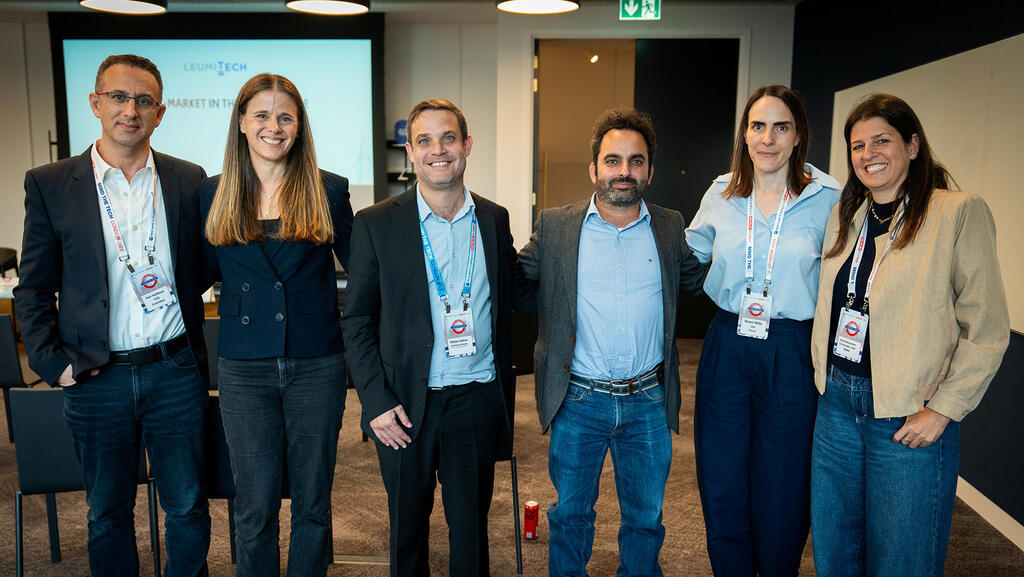
Mind the Tech London 2025
"Israeli entrepreneurs should view the UK as a viable secondary market for their activities"
LeumiTech CEO Maya Eisen Zafrir was speaking at a panel held during the Mind the Tech London conference. "Unlike elsewhere, in the UK you know very quickly where you stand," noted Orat Benyamini, co-founder and CEO of REKKI.
“What’s interesting about Israeli entrepreneurs is that they almost automatically look to the U.S. when planning their expansion. That shouldn’t necessarily be the case. We want to teach them that the UK can be seen as a viable secondary market for their activities,” said LeumiTech CEO Maya Eisen Zafrir, opening a roundtable on strategies for entering the European and British markets at the Mind the Tech London 2025 conference of Calcalist and Bank Leumi.
Matan Safran, economic attaché at the Israeli Embassy in the UK, told participants: “The British audience is a conservative one. In my experience, companies need to demonstrate a higher level of maturity compared to other markets. They also need a local branch or representative who can help them speak the local language.”
Orat Benyamini, co-founder and CEO of REKKI, added: “What stands out in the UK compared to other markets is the British value of fairness, in their own way. They’ll tell you their true opinion. Unlike elsewhere, here you know very quickly where you stand. It’s a smaller market, but that makes it easier to know whether what you’re doing is working or not.”
Noam Mills, CEO and co-founder of Panax, argued that “the British market is better than the American one in the sense that becoming a big company in the U.S. requires far greater investment. Globalization in the UK is stronger than in the U.S., and credibility here is another advantage. From my experience, entering the UK opened doors and allowed us to test the true potential of our company.”
Dvir Hoffman, CEO of CommBox, emphasized regulatory and labor issues: “There are things to consider when you come to the UK, particularly around regulation and workers’ committees. As for the U.S. versus the UK, the U.S. offers higher value but with higher risk, and Israelis are very attracted to that. But you need to spend twice as much time there on sales and marketing. If you succeed in the U.S., it scales across the country. In the UK and Europe, it doesn’t work the same way.”
When asked by Eisen Zafrir about promising sectors beyond fintech, Hoffman responded: “I think education and healthcare both have strong potential. But they come with a very high price. It requires a lot of effort, yet once you succeed, it brings large budgets and significant demand.”
Roy Azoulay, co-founder and CEO of Cynomi, spoke about timing: “It really depends on the stage of the company. At later stages, the British market can be very good for you. But I advise companies not to rely on a single deal, no matter how big. You need to really understand the market.”
Benyamini stressed the importance of cultural fit: “People here are patient with outsiders, but they want to know they can pick up the phone and get a response from you as an entrepreneur or senior executive. You can’t underestimate the need to speak the local language. When we went to the U.S., we assumed they spoke English, but they speak American English. There’s great value in truly living and breathing the local language, understanding the terminology and speaking the customer’s language.”
Related articles:
Mills highlighted another factor: “The time difference between Israel and the U.S. is also significant, especially for customer support and operating hours.”
Safran addressed fundraising: “Israeli entrepreneurs sometimes arrive in London unprepared. They overestimate themselves and underestimate the maturity of British investors. London is a global hub. Today we’re seeing more success with strategic investors, who tend to be less concerned about geopolitical shifts.”
Finally, Azoulay pointed to opportunities beyond sales: “Expanding into the British market doesn’t have to be only about sales. We have a development team here that works closely with our team in Israel, and that creates a great balance. I’d recommend exploring options beyond just sales.”